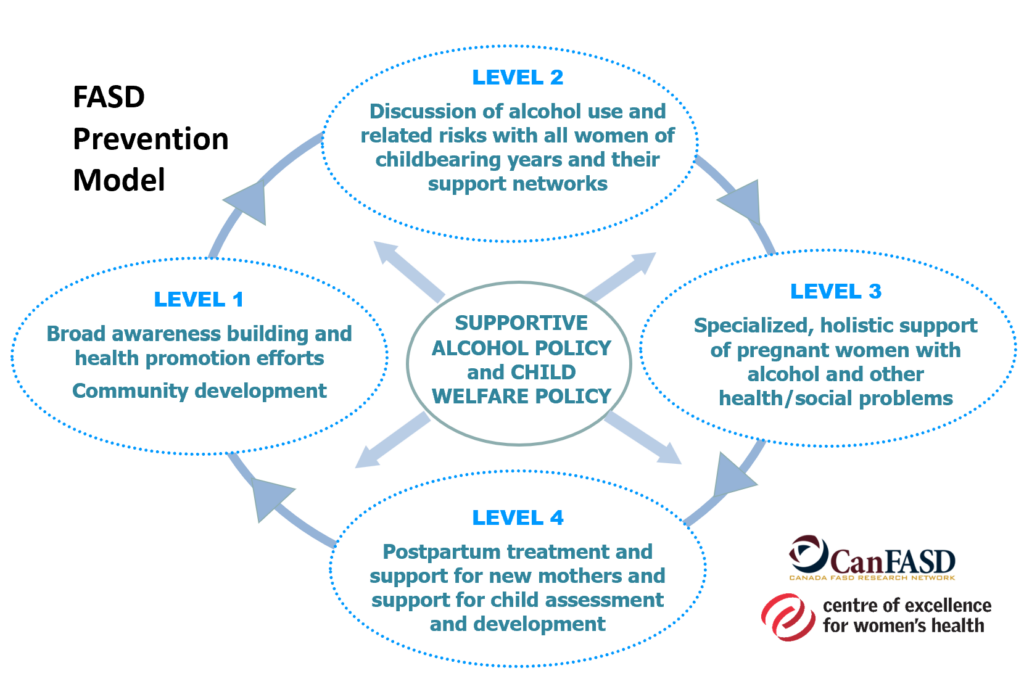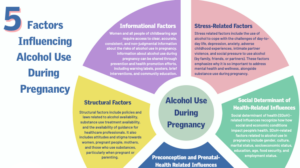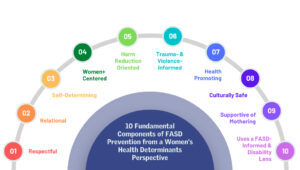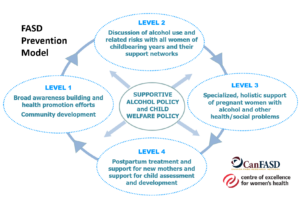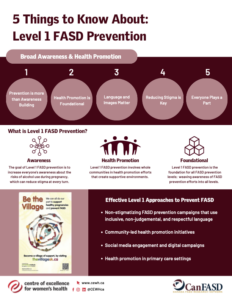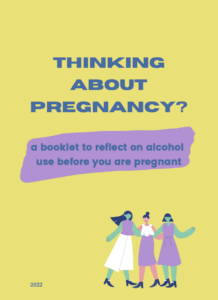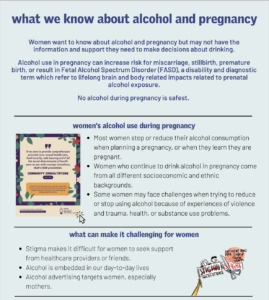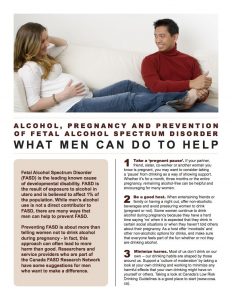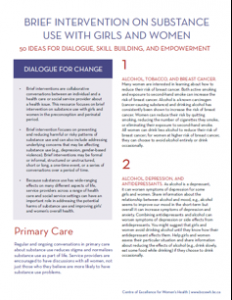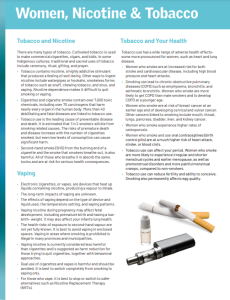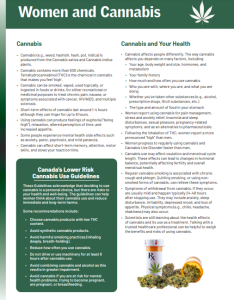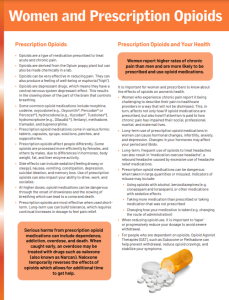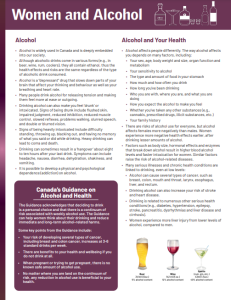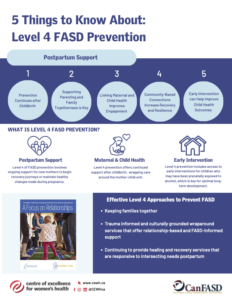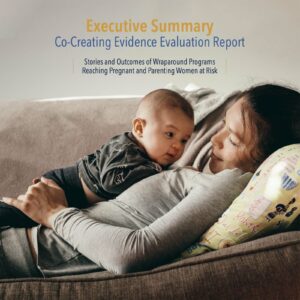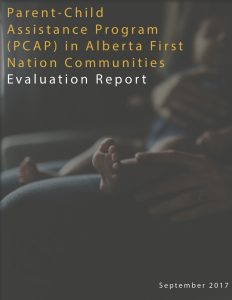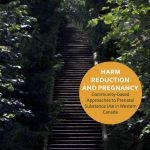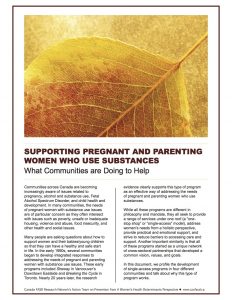About FASD Prevention
Canadian prevention specialists have identified four mutually reinforcing prevention approaches as effective in delivering FASD prevention, linked to overall policy strategies. The four levels span general and specific practices that assist women to improve their health and the health of their children, with support from family, support networks, services and community.
Level 1
The first level of prevention is about raising public awareness through campaigns and other broad strategies. Public policy initiatives and health promotion activities supportive of girls’ and women’s health are also key to this level of prevention. The inclusion of a broad range of people at the community level is important to advancing social support and change.
Level 2
The second level of prevention is about girls and women of childbearing years having the opportunity for safe discussion about reproductive health, contraception, pregnancy, alcohol use, and related issues, with their support networks and healthcare providers.
Level 3
The third level of prevention concerns the provision of supportive services that are specialized, culturally safe and accessible for women with alcohol problems, histories of violence and trauma and related health concerns. These trauma-informed, harm-reduction-oriented recovery services are needed not only for pregnant women, but also before pregnancy and throughout the childbearing years.
Level 4
The fourth level of prevention is about supporting new mothers to maintain healthy changes they have been able to make during pregnancy. Postpartum support for mothers who were not able to make significant changes in their substance use during pregnancy is also vital to assist them to continue to improve their health and social support, as well as the health of their children.
Supportive Policies
Supportive alcohol policy is at the centre of the four mutually reinforcing levels of prevention. Evidence-based alcohol policies, when widely implemented, have considerable potential to reduce the health and social harms from alcohol, including influencing rates of FASD through each level. Alcohol policies are critical because they determine the availability of alcohol and other aspects of the environment in which decisions about drinking are made.
It is also important that maternal/child health and substance use policy is in alignment with supportive child welfare policy to ensure that care is wrapped around the mother child unit, and women are not afraid to access prenatal care out of fear of losing custody.
Key FASD Prevention Resources
Influences on Alcohol Use During Pregnancy
This infographic describes five key factors that influence alcohol use during pregnancy.
10 Fundamental Components of FASD Prevention
CEWH & CanFASD, 2022
This consensus statement, created in 2009 and updated in 2022, highlights the importance of looking at FASD prevention from a women’s health perspective.
Prevention of FASD: A Multi-Level Model
CEWH & CanFASD, 2013
This paper explains to four levels of FASD prevention and summarizes what has been learned about FASD prevention.
Developing an Indigenous Approach to FASD
CEWH, Thunderbird Partnership Foundation & CanFASD, 2019
This consensus statement outlines eight tenants for enacting the Truth and Reconciliation Commission’s Call to Action #33.
Girls, Women, Alcohol, and Pregnancy Blog
This monthly blog provides inside into new and upcoming resources and initiatives around girls, women, alcohol, and pregnancy.
ThinkFASD.ca
Created as part of a national alcohol and pregnancy awareness campaign, this site gives you the information you need whether you’re pregnant, thinking about pregnancy, or at risk for an unplanned pregnancy.
A Digital Handbook on Wraparound Programs
Part of the Co-Creating Evidence project, this digital handbook supports the creation, development, ongoing operation, and sustainability of wraparound programs for those who are pregnant and/or parenting with substance use and other concerns (en français).
Action on FASD Prevention in Canada (Brochure)
The Prevalence of Alcohol Use During Pregnancy in Canada
This issue paper describes what is known about the prevalence of alcohol use during pregnancy, identifies risk factors associated with alcohol consumption during the prenatal period, and provides recommendations.
Course: Perinatal Substance Use and Collaborative Practice
This course is designed for social workers, case workers, and practice leaders who work with women with substance use concerns and their families in acute care and community settings.
The Prevention Network Action Team (pNAT)
The Prevention Network Action Team (pNAT) is a pan-Canadian network of researchers, service providers, health planners, and community partners working on FASD prevention issues, as well as mothers of children with FASD.
Our pNAT has over 70 active members from across the country. We work with a broad spectrum of organizations and institutions, located from Whitehorse to Iqaluit, from St John’s to Victoria. The group meets virtually every month. We share highlights of resources and initiatives discussed in our meetings on the pNAT blog, Girls, Women, Alcohol, and Pregnancy.
The ‘power of networking‘ poster provides an overview of the network’s work and features pictures of a number of the members, highlighting and celebrating the network and collaborations.
Annual Annotated Bibliographies
Each year the pNAT researchers identify articles from the academic literature published in English on FASD prevention. We then organize the articles according to our 4 level prevention model. The 2024 annotated bibliography explores a list of research articles related to the prevention of alcohol use in pregnancy.
Review our past annotated bibliographies below.
Key Journal Articles
These key journal articles authored by pNAT members describe overall FASD prevention efforts:
Health Promotion and Support Grounded in Interconnected Influences on Alcohol Use in Pregnancy (open access)
Poole, N., Wolfson, L. & Huber, E.
Int. J. Environ. Res. Public Health, 2025
Supportive Alcohol Policy as a Key Element of Fetal Alcohol Spectrum Disorder Prevention
Wolfson, L. & Poole, N.,
Women’s Health, 2023
At a Juncture: Exploring Patterns and Trends in FASD Prevention Research from 2015 – 2021 Using the Four-Part Model of Prevention
Wolfson, L., Poole, N., Harding, K.D., & Stinson, J.
JFASD, 2022
“The Problem Is that We Hear a Bit of Everything…”: A Qualitative Systematic Review of Factors Associated with Alcohol Use, Reduction, and Abstinence in Pregnancy
Lyall, V., Wolfson, L., Reid, N., Poole, N., Moritz, K.M., Egert, S., Browne, A. J., & Askew, D.A.
International Journal of Environmental Research & Public Health, 2021
Collaborative Action on Fetal Alcohol Spectrum Disorder Prevention: Principles for Enacting the Truth and Reconciliation Commission Call to Action #33
Wolfson, L., Poole, N., Morton Ninomiya, M., Rutman, D., Letendre, S., Winterhoff, T.,… Rowan, T.
International Journal of Environmental Research & Public Health, 2019
Prevention of Fetal Alcohol Spectrum Disorder: Current Canadian Efforts and Analysis of Gaps
Poole, N., Schmidt, R., Green, C., & Hemsing, N.
Substance Abuse Research and Treatment, 2016
What do we mean by Level 1 Prevention?
The first level of prevention is about raising public awareness through campaigns and other broad strategies. Public policy initiatives and health promotion activities supportive of girls’ and women’s health are also key to this level of prevention. The inclusion of a broad range of people at the community level is important to advancing social support and change.
Resources
As well as academic publications, pNAT members and others across Canada prepare resources to guide improvements in practice and policy, to support the prevention of FASD. Here are some examples related to Level 1 prevention.
5 Things to Know about: Level 1 FASD Prevention (2025)
This info sheet describes how Level 1 FASD Prevention is designed to increase awareness about the risks of alcohol use in pregnancy and involve communities in health promotion efforts.
Thinking about Pregnancy: A Booklet to Reflect on Alcohol Use Before You Are Pregnant (2022)
This booklet includes information about why thinking about alcohol use during the preconception period is important as well as activities for reflection.
What We Know About Alcohol and Pregnancy (2022)
This inforgraphic summarizes what we know about pregnancy and alcohol, and what women have found helpful when making decisions to stop drinking in pregnancy.
Guidelines for Pregnancy Application (‘App’) Developers (2020)
These guidelines were created to support pregnancy app and online content developers in integrating alcohol- and FASD-related content that is clear, up-to-date, and non-judgmental in order for women, pregnant individuals, and families to learn more about alcohol/substance use during pregnancy and FASD to get the support they may need to have a healthy pregnancy.
Indigenous Approaches to FASD Prevention (2019)
These 5 booklets highlight how FASD prevention is understood and practiced in Indigenous traditional culture, recognize the historical, social, political, economic and cultural dimensions of alcohol use during pregnancy, and promote Indigenous women’s health and wellness overall. The series is a collaboration of The Centre of Excellence for Women’s Health, the Thunderbird Partnership Foundation, and the Canada FASD Research Network.
ThinkFASD (2020)
Created as part of a national alcohol and pregnancy awareness campaign, this site gives you the information you need whether you’re pregnant, thinking about pregnancy, or at risk for an unplanned pregnancy.
What Men Can Do to Help (2014)
Preventing FASD is about more than telling women not to drink alcohol during pregnancy – in fact, this approach can often lead to more harm than good. Researchers and service providers who are part of the Canada FASD Research Network have some suggestions for men who want to make a difference.
Issue Papers
Some of the CanFASD Issue papers address prevention issues and approaches
The Efficacy of Warning Labels on Alcohol Containers for Fetal Alcohol Spectrum Disorder Prevention (2019)
This issue paper explores the effectiveness of alcohol warning labels as an FASD prevention strategy and offers ideas to increase the potential use and impact of warning labels.
The Role of Partners in Fetal Alcohol Spectrum Disorder Prevention (2019)
This issue paper highlights the role of partners in influencing maternal alcohol consumption and offers suggestions to further integrate partners into FASD prevention efforts. Although most research to date has focused largely on the role of fathers in contributing to women’s substance use, we acknowledge that partners can be men, women, or gender-diverse people, and that some women may have multiple partners or may be single by choice or circumstance.
Journal Articles
These key journal articles authored by pNAT members describe Level 1 prevention efforts:
“You Don’t Want to Drink? What are you, Pregnant?!” Portrayals of Alcohol and Substance Use During Pregnancy on Television
Harding, K., Dionne, A., & Harding, E.
JFASD, 2022
Fetal Alcohol Spectrum Disorder: What does Public Awareness Tell Us about Prevention Programming
Choate, P., Badry, D., MacLaurin, B., Ariyo, K., & Sobhani, D.
International Journal of Environmental Research and Public Health, 2019
Are Rural and Urban Ontario Health Care Professionals Aware of Fetal Alcohol Spectrum Disorder? A Secondary Data Analysis of the Fetal Alcohol Syndrome Survey for Health Professionals
Coons, K.D., Clement, A.L., Watson, S.L.
Journal of Developmental Disabilities, 2017
“No Alcohol Is Recommended, But . . .”: Health Care Students’ Attitudes About Alcohol Consumption During Pregnancy
Coons, K.D., Watson, S.L., Yantzi, N.M., Lightfoot, N.E., Larocque, S.
Global Qualitative Nursing Research, 2017
What do we mean by Level 2 Prevention?
The second level of prevention is about girls and women of childbearing years having the opportunity for safe discussion about reproductive health, contraception, pregnancy, alcohol use, and related issues, with their support networks and healthcare providers.
Resources
As well as academic publications, pNAT members and others across Canada prepare resources to guide improvements in practice and policy, to support the prevention of FASD. Here are some examples related to Level 2 prevention.
5 Things to Know about: Level 2 FASD Prevention (2025)
This info sheet describes how Level 2 FASD Prevention can best include respectful, supportive discussions of alcohol use and related risks, with everyone in childbearing years.
Doorways to Conversations: Brief Intervention on Substance Use with Girls and Women (2018)
This resource introduces the context for brief substance use interventions, discusses opportunities for practice and factors that can contribute to the success of brief interventions, and approaches for engaging in brief interventions regardless of your practice setting.
Brief Intervention on Substance Use with Girls and Women: 50 Ideas for Dialogue, Skill Building, and Empowerment (2018)
This resource focuses on brief intervention on alcohol and other substance use with girls and women, on conversations that involve the potential harms related to substance use and also on improving girls’ and women’s overall health.
Talking About Substance Use During Pregnancy: Collaborative Approaches for Healthcare Providers (2019)
This practice resource offers ideas for open, supportive, and effective conversations with women and patients who use substances during pregnancy.
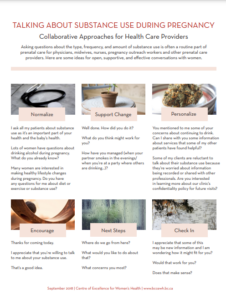
Going Forward: First Steps in Changing Your Relationship with Alcohol (2024)
This practice resource offers ideas for open, supportive, and effective conversations with women and patients who use substances during pregnancy.
Information Sheets
These information sheets may be helpful to service providers who discuss substance use with pregnant women and new mothers.
Issue Papers
Issue papers related to this level of prevention include:
Alcohol and Breastfeeding (2020)
This issue paper summarizes what is known about the effects of alcohol on lactation, as well as the impacts of alcohol use while breastfeeding on infant and child health.
Cannabis Use During Pregnancy (2018)
In 2018, the Canadian government introduced legislation that would allow adults to legally possess and use cannabis. This issue paper explores what is known about the effects of cannabis use during pregnancy.
Journal Articles
Issue papers related to this level of prevention include:
Beyond screening: Ideas and Actions to Address Preconception Substance Use
Poole, N., Stinson, J., Wolfson, L. & Huber, E.
International Journal of Birth and Parent Education, 2022
Guideline No. 405: Screening and Counselling for Alcohol Consumption During Pregnancy
Graves, L., Carson, G., Poole, N., Patel, T., Bigalky, J., Green, C., Cook, J.
JOGC, 2020
New approaches to brief intervention on substance use
Nathoo, T., Wolfson, L. Gelb, K., Poole, N.
Canadian Journal of Midwifery Research and Practice, 2019
The potential for FASD prevention of a harmonized approach to data collection about alcohol use in pregnancy.
Poole, N., Schmidt, R. A., Bocking, A., Bergeron, J., & Fortier, I.
International Journal of Environmental Research and Public Health, 2019
Preconception health care interventions: A scoping review
Hemsing, N., Greaves, L., & Poole, N.
Sexual and Reproductive Healthcare, 2017
What do we mean by Level 3 and 4 Prevention?
Level 3
The third level of prevention concerns the provision of supportive services that are specialized, culturally safe and accessible for women with alcohol problems, histories of violence and trauma and related health concerns. These trauma-informed, harm-reduction-oriented recovery services are needed not only for pregnant women, but also before pregnancy and throughout the childbearing years.
Level 4
The fourth level of prevention is about supporting new mothers to maintain healthy changes they have been able to make during pregnancy. Postpartum support for mothers who were not able to make significant changes in their substance use during pregnancy is also vital to assist them to continue to improve their health and social support, as well as the health of their children.
Resources
As well as academic publications, pNAT members and others across Canada prepare resources to guide improvements in practice and policy, to support the prevention of FASD. Here are some examples related to Levels 3 and 4 prevention.
5 Things to Know about: Level 4 FASD Prevention (2025)
This info sheet describes how Level 4 FASD Prevention involves continued support after childbirth, wrapping care around the mother-child unit.
5 Things to Know about: Level 3 FASD Prevention (2025)
This info sheet describes how Level 3 FASD Prevention is concerned with the provision of holistic support for those who are pregnant and face other health and social challenges, in respectful, relational, trauma-informed and culturally-grounded ways.
A Digital Handbook on Wraparound Programs (2023)
This digital handbook supports the creation, development, ongoing operation, and sustainability of wraparound programs for those who are pregnant and/or parenting with substance use and other concerns.
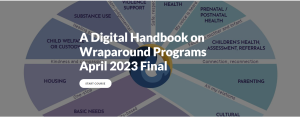
Co-Creating Evidence (CCE) evaluation study and Executive summary (2021)
This report offers the findings of the Co-Creating Evidence (CCE) evaluation study, an evaluation of eight community-based, Level 3 and 4 programs in Canada. The report describes the common elements these programs offer and the outcomes being achieved from the perspectives of the women who access these programs, the program providers and their community partners. A set of 12 two-pager info sheets that highlight key findings and promising practices from the CCE study are also available for download.
Revitalizing Culture & Healing: Indigenous Approaches to FASD Prevention (2019)
This booklet describes seven programs that exemplify how Indigenous communities across Canada are working to integrate culture and healing into their efforts to improve the health of women, children, and their families. Each program is community-led and culture-driven to promote healing through language, ceremony, protocols, traditional knowledge, Elders, and (re)building cultural identity for individuals and communities.
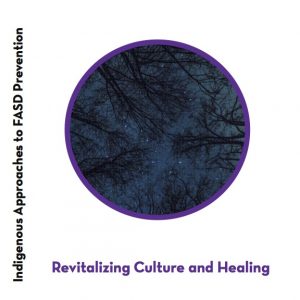
Parent-Child Assistance Program in Alberta First Nation Communities Evaluation Report (2017)
The evaluation provides key information about how the Parent–Child Assistance Program (PCAP) has been implemented, identifies areas for improvement, and provides outcomes for stakeholders to help inform decision-making.
Harm Reduction and Pregnancy (2015)
This booklet provides a short introduction to harm reduction approaches during pregnancy and uses examples from programs across Canada to illustrate how harm reduction has been practiced in action.
Supporting Pregnant and Parenting Women Who use Substances: What Communities are Doing to Help (2013)
This document profiles the development of one-stop-shop programs in four different communities and talks about why this type of program works.
Issue Papers
Gap Analysis: Human Trafficking and Alcohol Use in Pregnancy
The purpose of this gap analysis is to describe the interconnections between human trafficking and prenatal alcohol use, and to provide research, policy, and practice recommendations to support survivor centric FASD prevention efforts.
Alcohol and Breastfeeding
New mothers and health care providers need accurate information about the effects of alcohol intake while breastfeeding. This issue paper summarizes what is known about the effects of alcohol use on lactation, as well as the impact of alcohol use while breastfeeding on infant and child health.
Folic Acid, Choline Supplementation and FASD
Nutrition is an important aspect of a healthy pregnancy. This issue paper highlights what is known and the role of nutrition in healthy pregnancies, FASD prevention, and improving health equity for women and gender diverse people who use substances during pregnancy.
Journal Articles
Supporting pregnant and parenting women who use alcohol during pregnancy: A scoping review of trauma-informed approaches (2023)
Morton Ninomiya, M., Almomani, Y., Dunbar Winsor, K., Burns, N., Harding, K. D., Ropson, M.,… & Wolfson, L.
Women’s Health, 2023
Wraparound programmes for pregnant and parenting women with substance use concerns in Canada: Partnerships are essential
Hubberstey, C., Rutman, D., Van Bibber, M. & Poole, N.
Health & Social Care in the Community, 2021
Multi-service programs for pregnant and parenting women with substance use concerns: Women’s perspectives on why they seek help and their significant changes.
Hubberstey, C., Rutman, D., Schmidt, R., van Bibber, M., & Poole, N. International Journal of Environmental Research and Public Health, 2019
Becoming FASD-Informed: Strengthening practice and programming working with women with Fetal Alcohol Spectrum Disorder
Rutman, D.
Substance Abuse: Research and Treatment, 2016
Toward an evaluation framework for community-based FASD prevention programs.
Hubberstey, C., Rutman, D., Poole, N., Hume, S., & Van Bibber, M.
Canadian Journal of Program Evaluation, 2015
Reenvisioning Success for Programs Supporting Pregnant Women With Problematic Substance use.
Marcellus, L., MacKinnon, K., Benoit, C., Phillips, R., Stengel, C.
Qualitative Health Research, 2015
International FASD Prevention Seminar Series
Research about preventing FASD is advancing across the globe. In 2022, CanFASD sponsored a five-part seminar series that brought together 14 researchers from around the world to share what is known about preventing alcohol use in pregnancy and supporting women’s health. View the full five-part series below:

